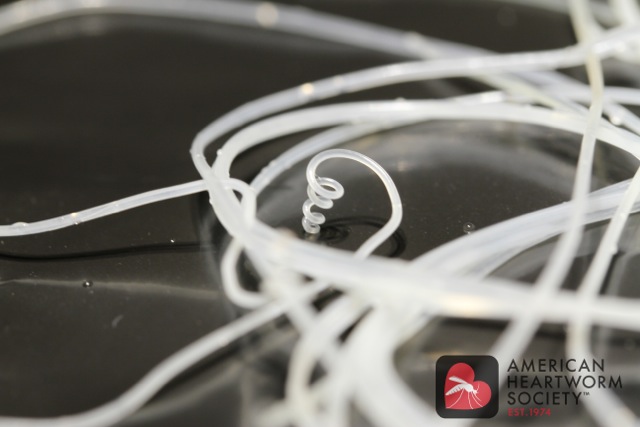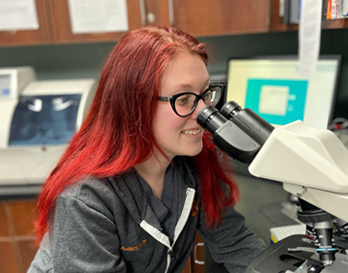Mosquitos are everywhere – especially in the Southeast we hear them year-round, buzzing around us outside and following us into our houses. Why does this matter? It matters because mosquitos are what transmit heartworms to our dogs and cats. As the name suggests, heartworms take up residence in the heart and can live there for years. They can reach 10-12 inches in length, and cause a variety of problems including respiratory distress, heart failure, and eventually death. But how does it get to that point?
What is it?
Heartworm disease is caused by Dirofilaria immitis, a parasite that travels through the bloodstream, and eventually finds its home within the heart. It is transmitted by the bite of an infected mosquito. This is the only way heartworms are transmitted; they cannot pass directly from one animal to another. Heartworm disease has been documented in all 50 states, with no way to predict risk factors. Heartworms affect our dog and cat friends differently. In severe cases dogs can have hundreds of adult worms wreaking havoc on their heart and lungs, eventually leading to death if left untreated. Cats with heartworm disease typically only have a few worms that make it into adulthood, if any. But even with a low worm burden they can still experience severe symptoms, even death.

Dogs
Dogs can experience a range of symptoms from mild to severe. This will depend on the worm burden and how long a dog has been infected. There are 4 stages of heartworm disease in dogs. Stage one is mild; a dog may only have an occasional cough. Stages 2 and 3 become more severe. Dogs can present with exercise intolerance, respiratory distress, and heart failure. Stage 4 is complete heart blockage, also called Caval Syndrome. At this stage the only treatment is surgical removal of the worms via the jugular vein, which is incredibly risky. Once the disease has progressed this far the chances of survival are low, and this is why veterinarians want to test your dog yearly – to find disease in the earlier stages.
Cats
Heartworm disease is not always obvious in cats. Symptoms can be mild to moderate, with coughing, decreased appetite, and weight loss. Various other diseases can also cause these symptoms. On the more extreme side cats can become ataxic (unbalanced), have seizures or ascites (fluid in the abdomen). Unfortunately, in some cases the first sign of a problem may be sudden collapse or death.
How does my pet get heartworms in the first place?
Mosquitos are a necessary part of the heartworm lifecycle. When a mosquito bites an infected animal; dog, cat, various wildlife; they pick up microfilariae, which are baby heartworms that circulate in the bloodstream. The microfilariae then develop into larvae, and are deposited into another animal (such as our pets!) when the mosquito bites it. In about six months those larvae will grow into adult heartworms and make their way to the heart, where they will reproduce and continue the cycle.
What do I do if my pet is heartworm positive?
Treatment for heartworm disease in dogs can vary depending on the stage of disease, and tends to be very expensive. It’s best to discuss your options with your veterinarian. When treatment has started and the adult worms start to die, there is a risk of life-threatening pulmonary embolism. To minimize this risk, it is imperative to keep your dog confined for the duration of treatment as advised by your veterinarian. This means no running, no playing, and leash walks to go potty. If your dog were to run around, his increased heart rate can increase the risk of complications.
Unfortunately for our cat friends, there is no treatment available, so prevention is key.
How can I prevent this?
The good news is that heartworm disease can be prevented. (And prevention is much more affordable than treatment!) There are many products to choose from, for dogs and cats, that your family veterinarian can discuss with you. It is important to know these products are only available with a prescription. Over-the-counter de-wormers will not prevent heartworms. It is recommended your pet be tested for heartworms as part of their yearly exam. If your pet already has heartworms, some preventions can cause severe reactions.
As stated previously, mosquitos are everywhere and they are a necessary part of the heartworm’s life cycle. All of our pets are at risk, even indoors. Heartworms have a severe impact on pets and their families, and treatment can be cost prohibitive. However, proper preventative care with our family veterinarians can allow our pets to live long and healthy lives!

Author:
Ashley, RVT
Ph: (912) 721-6410
Contact Us
